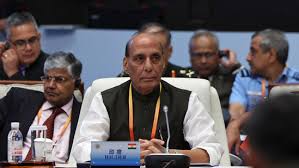India refuses to sign draft statement at SCO meet over silence on Pahalgam terror attack, Balochistan mention

India refused to sign the joint statement at the Shanghai Cooperation Organisation (SCO) Defence Ministers’ Meeting on June 26, 2025, in Qingdao, China. The move came after the draft excluded any mention of the April 22 terror attack in Pahalgam, Jammu and Kashmir, and included indirect references to Balochistan—aligning with Pakistan’s narrative.
Why Did India Decline?
India strongly opposed the draft’s silence on the Pahalgam attack. In that incident, militants from The Resistance Front, a group linked to Lashkar-e-Taiba, ambushed a convoy of Hindu pilgrims. The attack killed 26 people and injured many more. It triggered national outrage and widespread condemnation.
Despite the incident’s severity, the SCO draft did not mention it. However, it included language that hinted at unrest in Balochistan, where Pakistan often accuses India of inciting violence. India denies these allegations.
The imbalance in the draft troubled Indian officials. They argued that the document ignored India’s security concerns while giving space to Pakistan’s claims. For India, this reflected a selective and biased approach to terrorism.
Rajnath Singh Speaks Out
India’s Defence Minister, Rajnath Singh, addressed the gathering and made his country’s position clear. He said, “Terrorism has no justification. We must unite, rise above politics, and fight cross-border terrorism together.”
Singh also warned, “Terrorist hubs are no longer safe. If the world stays silent, consequences will follow.” His words sent a clear message to Pakistan without naming it directly. He emphasized that India would take necessary action to protect its people.
The Balochistan Reference
The communique’s indirect reference to Balochistan raised another red flag. Pakistan frequently claims that India fuels unrest in that region. Including such a reference, while ignoring the Pahalgam attack, appeared biased to India.
Indian officials viewed this as a diplomatic win for Pakistan. They believed that mentioning Balochistan validated false accusations and diverted attention from real terror threats.
By refusing to endorse the draft, India showed it would not support narratives that compromise its stance on terrorism.
Geopolitical Patterns Repeat
India’s refusal followed a pattern seen in previous SCO meetings. China and Pakistan, founding members of the bloc, have often blocked India’s efforts to include strong anti-terror language in SCO documents.
China’s responses to attacks in Kashmir have usually remained neutral. Even after deadly incidents like Pulwama and Uri, China avoided naming Pakistan or the attackers. This time, it again chose silence over solidarity.
India believes such actions reflect geopolitical bias, where strategic interests override fairness. By rejecting the current draft, India made it clear that it won’t compromise when its citizens are attacked.
Broader Diplomatic Impact
India’s decision could affect how the SCO operates in the future. The bloc includes major powers like Russia, China, and India, along with Central Asian countries. It aims to boost regional cooperation and security.
However, when core issues like terrorism divide members, true cooperation becomes difficult. India’s stand reveals the fragile unity within the SCO. It also shows that counter-terrorism efforts cannot succeed when some nations protect or excuse terror networks.
Strengthening Other Alliances
India’s refusal may also push it closer to Western alliances. It already works closely with countries like the U.S., Japan, and Australia in the Quad group. These partnerships focus on security, economic growth, and a free Indo-Pacific region.
As India deepens ties with these partners, its role in groups like the SCO may shift. It will likely engage on its own terms, without accepting narratives that clash with its national interests.
Final Thoughts
India’s decision to walk away from the SCO draft statement was bold but principled. It highlighted the need for equal accountability in global terrorism. Ignoring the Pahalgam attack while raising issues like Balochistan showed a dangerous double standard.
Rajnath Singh’s clear message, and India’s refusal to sign the statement, send a strong signal. India wants fairness, not politics, in regional cooperation. It will not tolerate selective silence on terrorism, especially when its citizens suffer.
This stand may create short-term friction, but it sets a firm precedent. India’s message to the world is clear: terrorism, in any form, must be condemned—not ignored, justified, or politicized.






